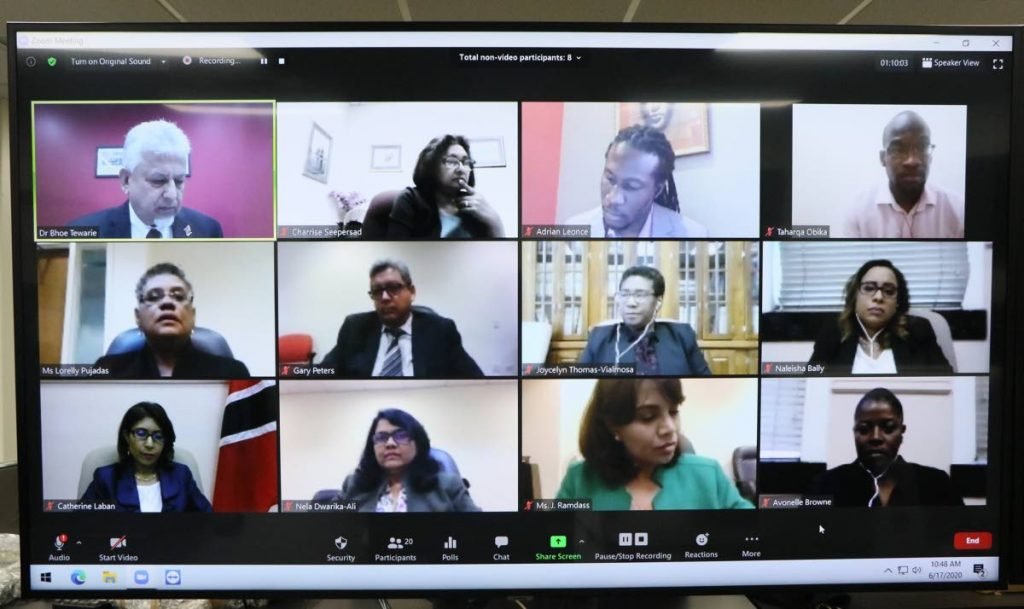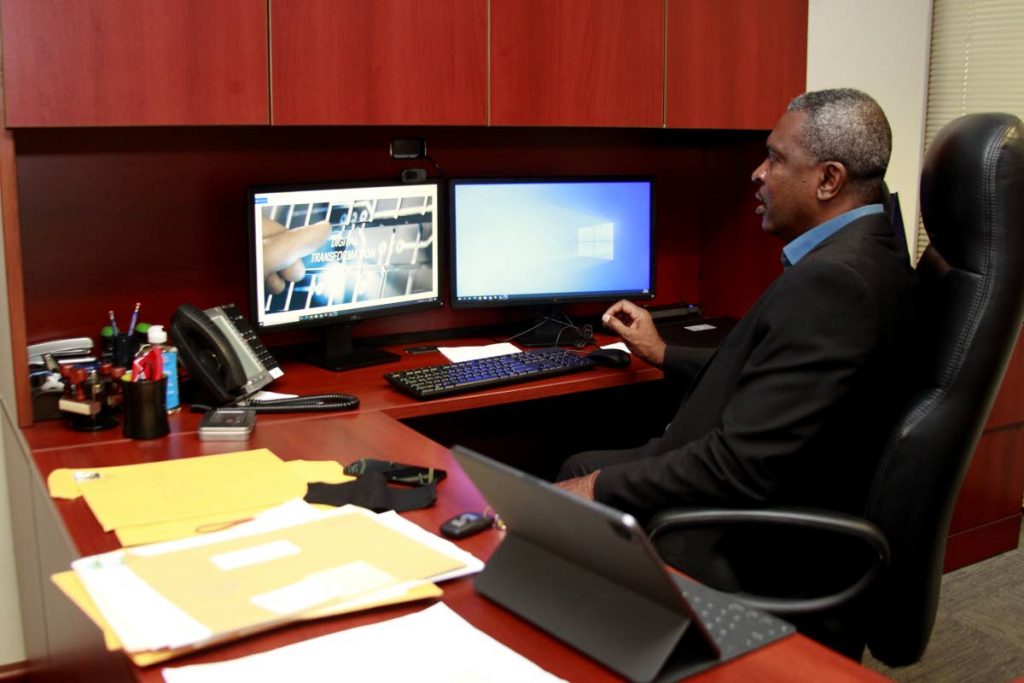Minister Hassel Bacchus working to move Trinidad and Tobago toward e-governance

In 1979, the Workers Bank, now known as First Citizens Bank, introduced “Mary-Anne All Day All Night Service,” Trinidad and Tobago’s first automated telling machine.
People did not know it back then, but that would be the first of a long line of information communication technology (ICT) systems that would use technology to make citizens’ lives easier.
TT has come a long way since then, not only with ATMs, but with technology in general. Now people can not only withdraw money from banks, but can transfer money from TT to another country. They can find out the status of their NIS contributions, apply for relief grants, school grants, food cards and even begin processes to start a business, all from the comfort of their homes.
From digital workplaces to government systems operating online to people themselves spending hours of their day communicating and interacting with each other online, TT has, without a doubt, the means to keep pace with the ever-changing world of technology, even in these uncertain times.
Minister in the Ministry of Public Administration and Digital Transformation Hassel Bacchus told Business Day that while infrastructure, technology, re-education and legislation would improve ICT systems and how they benefit people in TT, people need to be educated on and trust the systems that are developed and maintained by our local technicians and talents in the ICT industry.
“You would find that the same people that would physically go into a line to pay their electric bill – even though there are three digital means to pay that bill – would be the same people that would buy their shoes on Amazon.
"So it is not that people are scared of technology. What it is, is that there must be a level of trust and confidence that, if I use digital means to do this thin,g it will be completed.”

Over the years, governments have seen the value of using ICT systems to transform the way things work. As early as 2003, the Fast Forward programme under the Ministry of Public Administration had a list of objectives that TT benefits from today. It aimed to provide citizens with affordable internet access, focus on the development of children's knowledge and awareness of ICT, maximise the potential of citizens through the use of ICT and encourage innovation to develop a knowledge-based society and promote citizen trust, access and interaction through the use of ICT.
The objectives evolved in 2018, when the ministry published its ICT plan for 2018-2022. The ministry sought to increase the use of ICT in the country – not only through personal use, but in the development of e-government.
It sought to use ICT to encourage competition in the business sector and develop an infrastructure enabled by legislation and supported by a skilled workforce to innovate and enhance processes and operations. It also planned to develop and deliver government services online in such a manner that it would be the go-to when people needed to get something official done.
“There are a number of solutions that were built across many ministries that are really good – but only that ministry knows about it,” Bacchus said.
“Did you know that you could go to Cariri to solve an IT problem in your building? Cariri has an entire place in central TT that does a number of things, including IT support.
"There are a number of investors looking for good ideas. There are a number of innovators who are offering services to the state and the private sectors – but they don’t know which doors to knock.”
Government, too, has several systems which are not known, including the ability to get updates on NIS contributions, find your BIR number, apply for social support services, pay bills, get job letters to apply to banks and even make a complaint about a food or drug.
“So instead of taking a day to get the job letter, then a day to take it to the bank, you can do it online,” he said. “But only a few ministries have this.”
Even more recently, government was able to facilitate relief and support to citizens affected by loss of work or reduction in finances because of measures put in place to combat covid19. In May, Minister of Finance Colm Imbert told reporters that in a 48-hour period more than 14,000 people applied online for salary relief grants, and more than 70,000 visited the site.

Bacchus said for TT to move forward using ICT solutions, people need to be empowered to use the technology and mechanisms in place; there must be an ecosystem where businesses could compete and thrive; and government itself needs to transform into what is called an e-government.
Bacchus said an e-government was the best way to govern for all “customers” of the state – citizens, businesses and those who provide services on behalf of the state.
“At a high level it encompasses the technology, the legislation and people,” Bacchus said.
People in the first instance need to be informed of the many measures put in place by the public and private sector to make life easier through the use of ICT. In the next instance they should be able to use it easily.
“It is about integrating technology for the benefit of the citizens,” Bacchus said. “It isn’t about putting in technology for the sake of putting it in. It has to be applicable and relevant and have a positive impact on people.”
He added that it must also be secure. He said there was a need to manage cyber risk and noted that while government may not be able to completely lock out all malicious entities, it will make it as hard as possible for them to get in.
“We have a national security system that looks at all our programs and makes sure that they are safe. The preparations that we have are to make it as difficult as possible, but we have contingency plans in case there is still a problem.”
There also needs to be education on the systems available, as well as interest in being educated to compete in ICT industries.
In the education sector as well there is interest in ICT, said Patrick Hosein, professor of computer science at UWI.
“Digitisation is not new, and companies in the developed world have been pursuing this for decades. So courses and opportunities have been available for quite some time,” Hosein said.
“The issue is not whether we have graduates with the required expertise, but that fact that so far companies and government have been reluctant to change processes to take advantage of digitisation.
“I would not say that interest in the field is lacking. What is lacking is the willingness of government and companies to make the changes in their processes.”
Courses at UWI include computer science, computer science and management, information technology and management and data science programmes
Bacchus added that legislation like the Data Protection Act and the Electronic Transactions Act would give support to protect and enable both the public and private sector to conduct online transactions safely.
Bacchus noted that government still isn’t where it wants to be where ICT support is concerned. There are still some kinks so that the programmes intended to help people make it all the more difficult. He said sometimes ministries would have to operate in silos to address something immediate. That would cause a "variation of service."
“Part of what we are trying to change has been embedded in how government does things. If you look back at a lot of earlier programs, they were very siloed in the way they operate. The Ministry of Health would build their own programs, and the Ministry of Finance would build their own, and so on.
"That approach is good and has its advantages, but it has to be tied to a strategic plan. Some would build things that other ministries would also be building, some would build things without understanding what other ministries are doing.”
One of the things that were put in place, Bacchus said, was to create the necessary level of integration.
He said government is developing the framework to deal with specific issues like applications and shared services with a centralised framework that would be able to handle a large number of people.
Central Bank officials as well have encouraged the use of ICT technology in financial transactions. It even has completed research and will assess the feasibility of its own cryptocurrency as part of its 2021-2026 strategic plan.
"The Bahamas, ECCB and China, for example, have created their own central bank digital currency (CBDC), which is a digital currency that is backed by fiat money or a digital form of the local currency. A number of other countries are in different stages of exploring or developing a CBDC," the Central Bank said.
The bank said it embraces the potential of the digital world, and as a regulator has to approve aspects of digital mechanisms to ensure they are in line with the legislation, as well as encouraging public education on ICT solutions in the financial sector. "The digital environment has improved over the last five years: in the banking sector, we see more EMV- enabled chip and PIN debit and credit cards to promote cashless payments and e-commerce; internet banking and ACH transfers; increased online presence and transactions (households and firms). The covid19 pandemic has also created opportunities for greater digitisation in the financial sector. In terms of legislation, the Central Bank developed an E-Money Policy that allows for persons other than licensed financial institutions to issue e-money."
As part of its own education drive, the bank will be hosting a webinar, Improving Financial Payments Arrangements in TT, which will be live-streamed on June 22.

Comments
"Minister Hassel Bacchus working to move Trinidad and Tobago toward e-governance"